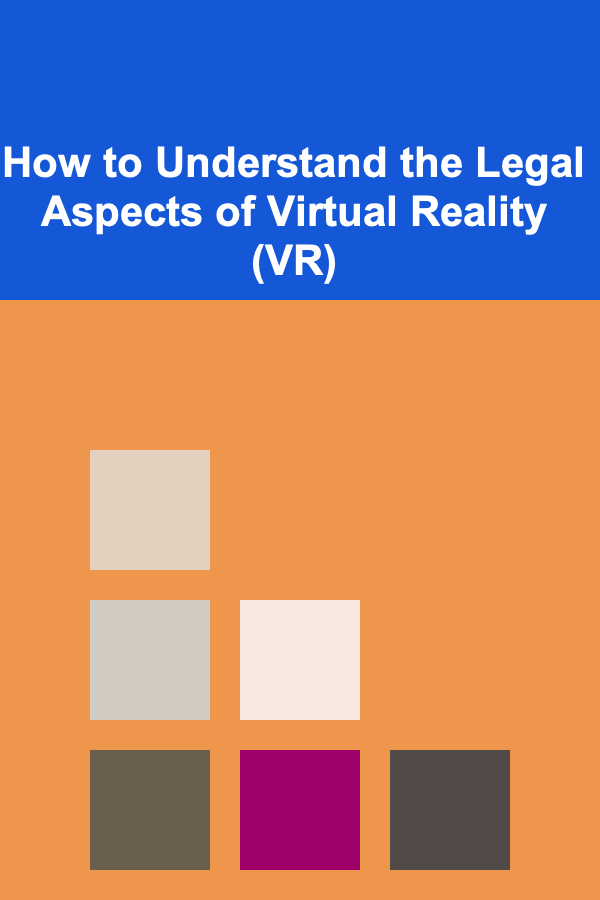
How to Understand the Legal Aspects of Virtual Reality (VR)
ebook include PDF & Audio bundle (Micro Guide)
$12.99$10.99
Limited Time Offer! Order within the next:

Virtual Reality (VR) has rapidly evolved over the past few years from a niche technology used primarily in gaming and simulation to a tool with vast applications across entertainment, education, healthcare, and business. As VR continues to expand into various industries, it brings along a host of legal concerns that need to be addressed. Understanding the legal aspects of VR is essential for companies, creators, and users who engage with this technology. These concerns span intellectual property (IP) rights, privacy, safety regulations, data protection, content creation, and user rights.
This article will delve into the various legal aspects that surround VR, exploring how the law applies to this immersive technology, and the challenges that arise from its unique characteristics. We will break down the legal issues involved, offer a closer look at the intersection of law and technology, and discuss the implications of these issues for VR businesses and users.
The Legal Landscape of Virtual Reality
The legal implications of VR are complex and multifaceted. While VR is often considered a subset of augmented reality (AR) and mixed reality (MR), it has its own distinct challenges in terms of how laws are applied. Virtual worlds or VR environments are often unregulated, and existing legal frameworks are not always equipped to address the nuances of this technology. Moreover, legal issues in VR often overlap with those found in video games, online platforms, and even physical world laws.
1. Intellectual Property and Copyright in VR
One of the most prominent legal concerns in VR is intellectual property (IP). As VR environments are created, users interact with virtual objects, landscapes, and experiences, which are typically copyrighted or protected under other IP laws. IP rights cover everything from the underlying software to the 3D models, textures, sounds, and even the design of virtual spaces.
a) Copyright Issues
Creators of VR environments and applications must navigate the complexities of copyright law. For instance, who owns the rights to virtual objects created within a VR space? What happens when users upload or create their own content within a VR platform? Do they retain ownership of the content they create? If an app or game has user-generated content, creators often specify ownership rights in their terms of service. In some cases, VR developers retain the right to use, modify, or distribute user-created content, leading to potential conflicts over IP ownership.
b) Patents
The patenting of VR technologies is another critical area. As new VR hardware and software continue to be developed, there are potential patent issues concerning both technology and design. For instance, new ways to track user movement or innovations in haptic feedback may be patentable. Companies involved in VR development need to ensure that their products do not infringe on existing patents. The VR space has seen numerous patent disputes, especially between companies like Oculus, HTC, and Sony, which own patents for various VR technologies. Understanding the existing patents and filing for new patents is essential for companies to protect their innovations.
c) Trademarks
Trademarks also play a significant role in VR. As VR applications and platforms proliferate, it is vital for developers to protect their brand identity. For example, companies that create VR hardware or software may need to trademark their logos, names, and even certain virtual experiences to avoid infringement and confusion in the marketplace. VR companies often use trademarks as part of their branding efforts to create a distinct identity for their products in a crowded market.
2. Privacy Concerns and Data Protection
As with any technology that collects and processes user data, privacy and data protection in VR are major concerns. VR systems collect a wealth of personal data from users, including visual, auditory, and even physiological information. Sensors in VR headsets track eye movement, head rotation, and even biometric data like heart rate and muscle tension. This data can reveal a lot about a user's emotions, preferences, and behaviors.
a) User Data Collection and Consent
Data privacy in VR is complicated by the fact that VR applications often collect sensitive personal information in ways that users may not fully comprehend. For example, some VR platforms collect biometric data, which could be vulnerable to misuse or exploitation. Consent becomes a crucial issue when users unknowingly share personal data that could be exploited by third-party advertisers or sold to other companies.
Legal frameworks such as the General Data Protection Regulation (GDPR) in Europe and the California Consumer Privacy Act (CCPA) in the United States impose strict regulations on data collection, storage, and processing. These regulations mandate that VR companies obtain informed consent from users before collecting data, disclose how data will be used, and allow users to opt-out of data collection when possible.
b) Children's Privacy
Another aspect of privacy in VR involves protecting children's data. VR platforms aimed at younger audiences, or those that collect data from minors, are required to comply with laws such as the Children's Online Privacy Protection Act (COPPA) in the U.S. VR developers must ensure that their platforms do not collect personal information from children under the age of 13 without parental consent.
3. Liability and Safety in Virtual Environments
Safety is a critical concern for both users and developers in the VR world. Due to the immersive nature of VR, users may be exposed to physical risks, such as tripping over obstacles or experiencing discomfort due to extended use of the headset. There is also the risk of psychological harm or distress due to violent, disturbing, or inappropriate content.
a) Physical Injury
Users of VR systems can face physical injuries such as falls or collisions with objects in their environment. While VR platforms and developers usually provide warnings about the potential risks, there is ongoing debate regarding the extent to which VR companies should be held liable for user safety. When an accident occurs, who is responsible? The manufacturer of the VR hardware? The developer of the virtual environment? Or perhaps both? These are questions that need to be addressed from a legal standpoint.
Additionally, the use of VR can cause motion sickness in some users, known as "VR sickness," which can impair the user experience. Although it is not a direct physical injury, it raises the question of how much responsibility developers and manufacturers have in minimizing the risk of motion sickness and ensuring that users are aware of potential health issues before they engage with the technology.
b) Content Moderation
Content moderation is another essential aspect of safety in VR. Just like online platforms, VR spaces can become breeding grounds for harmful behavior such as harassment, bullying, or hate speech. With the anonymity provided by virtual environments, users may engage in inappropriate behavior that violates the terms of service of the platform. As a result, VR developers must implement content moderation systems, whether automated or human-powered, to prevent harm to users and ensure a safe virtual environment.
There are legal and ethical questions about how much control companies should have over virtual worlds and user behavior within them. Should VR companies be responsible for monitoring and curbing inappropriate content in real-time, or is it the responsibility of users to report such behavior?
4. Regulation of Virtual Economy
As VR expands, virtual economies are emerging, where users can purchase, sell, or trade digital goods and services within virtual environments. These digital goods can include virtual real estate, avatars, clothes, and accessories for avatars. In some VR applications, users can even exchange virtual currency for real-world money.
a) Monetary Transactions and Consumer Protection
The virtual economy raises questions about consumer protection. How can consumers ensure that their virtual assets are secure? What happens if a virtual marketplace shuts down, leaving users without access to their purchases? Additionally, VR platforms that incorporate in-app purchases or virtual currency must comply with consumer protection laws to prevent fraud, deceptive advertising, and unfair business practices.
b) Cryptocurrency and Blockchain
Some VR platforms are beginning to integrate cryptocurrencies and blockchain technologies into their virtual economies. For instance, VR platforms may allow users to purchase virtual assets using cryptocurrencies like Bitcoin or Ethereum. Legal issues arise when virtual currencies are used in VR for transactions that involve real-world money. Regulatory bodies must determine whether cryptocurrencies in VR should be subject to financial regulations such as anti-money laundering (AML) or know-your-customer (KYC) rules.
5. Ethical Considerations and Social Impact
Beyond the legal concerns, VR also raises ethical questions that need to be considered by developers, lawmakers, and society as a whole. One of the primary ethical issues surrounding VR is the potential for creating addictive environments that encourage excessive use, particularly among vulnerable groups. VR addiction could lead to physical, mental, and social harm, and developers must take steps to minimize these risks.
Additionally, VR has the potential to blur the lines between the real and virtual worlds, which raises concerns about identity, relationships, and the implications of living in a virtual space. Legal systems will need to grapple with these challenges and adapt to the emerging social realities of VR technology.
6. The Future of VR and Legal Challenges
As VR technology continues to evolve, it will undoubtedly create new legal challenges. Governments, legal professionals, and businesses will need to collaborate to develop new frameworks that address the specific needs and risks associated with virtual environments. One area that is likely to see significant development is the regulation of artificial intelligence (AI) within VR, as AI plays an increasing role in shaping virtual experiences and interactions.
As VR becomes a more integral part of everyday life, legal frameworks must adapt to ensure that user rights are protected, intellectual property is respected, and virtual spaces remain safe and secure for all participants.
Conclusion
The legal aspects of Virtual Reality are still in their infancy, and many areas remain unregulated or ambiguously defined. As VR continues to gain traction across industries, the legal landscape will have to evolve to address issues such as intellectual property rights, privacy concerns, user safety, and the regulation of virtual economies.
For entrepreneurs, creators, and developers involved in the VR industry, it is essential to stay informed about the evolving legal landscape. By understanding these legal aspects, they can create safer, more secure, and more ethical VR experiences that comply with current laws while anticipating future regulations.
As VR grows and becomes more integrated into society, it will inevitably raise complex legal and ethical questions. Legal systems worldwide must evolve to meet these challenges and ensure that VR technology benefits society without compromising the rights and safety of users.
Reading More From Our Other Websites
- [Home Renovating 101] How to Maximize Small Spaces During a Home Renovation
- [Rock Climbing Tip 101] Breaking in Your New Climbing Shoes: Tips to Maximize Comfort and Performance
- [Tiny Home Living Tip 101] Best Techniques for Maximizing Natural Light in Small Interiors
- [Personal Care Tips 101] How to Make a Natural Face Mask at Home
- [Home Lighting 101] How to Create Ambiance with Mood Lighting on a Budget
- [Home Maintenance 101] How to Find the Right Replacement Parts for Your Appliances
- [Personal Finance Management 101] How to Make the Most of Employee Benefits for Financial Gain
- [Home Maintenance 101] How to Inspect and Clean Your Gutters for a Maintenance-Free Home
- [Scrapbooking Tip 101] Beginner‑Friendly Theme Ideas: From Travel Diaries to Family Milestones
- [Organization Tip 101] How to Incorporate Multi-Functional Furniture into Your Hobby Space

How to Build a Family Cookbook Together
Read More
How to Conduct a Comparative Market Analysis
Read More
How to Maintain a Tidy Car with Simple Organization Hacks
Read More
How to Produce Glitch Hop with FL Studio
Read More
How to Build a Hockey Team Culture of Resilience
Read More
How to Build a Flight Attendant Capsule Wardrobe
Read MoreOther Products

How to Build a Family Cookbook Together
Read More
How to Conduct a Comparative Market Analysis
Read More
How to Maintain a Tidy Car with Simple Organization Hacks
Read More
How to Produce Glitch Hop with FL Studio
Read More
How to Build a Hockey Team Culture of Resilience
Read More